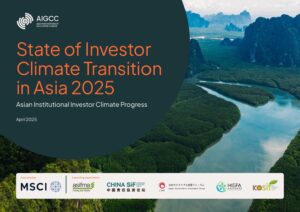Hong Kong institutional investors are mostly aligned with their whole of Asia peers on key climate metrics and are gradually recognising the financial materiality of climate change.
While some leading Hong Kong-headquartered investors have demonstrated notable progress in advancing their climate strategies, many institutional investors in the region are still gradually working to improve and broaden their climate considerations and strategies. This includes integrating physical risk management while also setting and meeting interim emissions reduction targets across their portfolios.
AIGCC assessed investors’ performance against metrics for managing climate risks and opportunities. The new data covers 18 institutional investors headquartered in Hong Kong with US$968 billion in collective assets under management (AUM).
The data is an exclusive Hong Kong-focussed extract complementing the sixth edition of the Asia Investor Group on Climate Change (AIGCC)’s annual flagship report, ‘The State of Investor Climate Transition in Asia 2025’, which reviews 230 of the most significant and influential investors across Asia.
With Asian investors highly exposed to climate impacts, AIGCC’s research highlights the need for more Hong Kong asset owners to take on the mantle and lead asset managers in the climate transition.
In summary, the Hong Kong investor cohort is aligned with the average Asian investor across a few climate aspects:
- Recognition of Climate Risks/Opportunities: This is gradually becoming mainstream investment practice amongst Hong Kong investors as 73% of investors are now recognising the financial materiality of climate change.
(vs Overall Asia Investor Average of 75%)
- Policy on Climate Integration in Investments: Most of Hong Kong investors (72%) have integrated climate considerations into their investment policies.
(vs. Overall Asia Investor Average of 66%)
- Publication of ISSB/TCFD-related Disclosures: 50% of Hong Kong’s investors have published climate-related disclosures that are aligned with the international benchmark.
(vs. Overall Asia Investor Average of 54%)
- Publication of Advanced Scenario Analysis: 50% of Hong Kong investors have published climate scenario analysis.
(vs. Overall Asia Investor Average of 44%)
- Policy on Approaches to Fossil Fuels or High-Emitting Sectors : 44% of Hong Kong investors have disclosed results of portfolio physical risk assessments, although actions to build resilience and adaptation to climate risks remain nascent.
(vs. Overall Asia Investor Average of 43%)
AIGCC has also identified key areas for Hong Kong investors to improve. Asset owners can take the lead and require more progressive climate-considerations in asset management mandates with fund managers:
- Climate Solutions and Transition Finance: 17% of Hong Kong’s investors have a target, or disclose investment in, climate solutions investments, including transition investments and scaling up low-carbon solutions.
(vs. Overall Asia Investor Average of 35%)
- Reporting on Voting Decisions: Very few (6%) of Hong Kong’s investors have disclosed their stance on shareholder climate resolutions in their investee companies, which remains a key lever for Hong Kong investors to achieve Paris-aligned outcomes for their portfolios.
(vs. Overall Asia Investor Average of 39%)
- Interim Portfolio Emissions Reduction Target: 23% of Hong Kong investors have set near-term climate goals (for example, 2030 or 2035 emissions reduction targets).Setting robust interim targets form the basis for investor transition plans and near-term strategies.
(vs. Overall Asia Investor Average of 36%)
- Disclosure of Physical Risks/Adaptation Actions: 39% of Hong Kong investors have disclosed results of portfolio physical risk assessments, including actions to build resilience and adaptation to climate-related risks.
(vs. Overall Asia Investor Average of 43%)
- Advocacy of Climate-Aligned Policy/Regulation: Currently 17% Hong Kong investors (vs. Overall Asia Investor Average of 25%) have referenced climate policy advocacy in their annual reporting. However, they do not yet appear to publicly disclose support or actions relating to climate policy advocacy and related engagements (vs. Overall Asia Investor Average of 7%)
AIGCC CEO, Rebecca Mikula-Wright said: “Recent severe and increasingly frequent extreme weather events, including heatwaves, floods and typhoons emphasise the urgency for investors to integrate physical risks in their portfolios to ensure long-term resiliency.
“We’re pleased to see an increasing number of Hong Kong investors publishing disclosures in line with international standards, which reflects the Hong Kong government’s move to mandate investor climate-related disclosures.
“We encourage Hong Kong asset owners to step up their climate leadership and continue to demonstrate their commitment to the climate transition.
“By setting climate-aligned mandates, asset owners can strongly influence asset managers’ asset allocation and stewardship efforts to be more climate-aligned.
“Investors across Asia should complement corporate engagement targets with robust asset alignment targets – these remain nascent across the Hong Kong institutional investor landscape. The Net Zero Investment Framework 2.0 outlines how investors can do this.”
Fidelity International, Director, Sustainable Investing, Paul Milon said: “It is encouraging to see that most Hong Kong-based asset owners now recognise the financial materiality of climate change and integrate it in their investment policies. This progress aligns with local regulators’ strong support for climate-related disclosures and a greater integration of climate-related risks by financial institutions. As local and regional asset owners continue to advance their climate approach and review portfolio allocations, we look forward to partnering with them to develop solutions aligned with the transition to a low carbon economy.”
In-Person Briefing
AIGCC will present more insights during an in-depth investor briefing held in-person in Hong Kong, on Tuesday, 9 September 2025, focussing on data from AIGCC’s flagship report, State of Investor Climate Transition in Asia 2025 and the performance of Hong Kong investors. This will be followed by a dialogue featuring: Chi Zhang, Head of Sustainable Investment, AIA Group; Neil Mascarenhas, Head of ESG & Sustainable Investing, Group Office, FWD Group; and Enci Wang, Senior Group Manager, Group Chief Investment Office, Prudential plc.
AIGCC thanks MSCI for their sponsorship of the report and event as well as AIA for hosting the event.
AIGCC’s ‘The State of Investor Climate Transition in Asia’ report is the most comprehensive and reliable snapshot of how decision-makers in the region’s capital markets are managing climate and nature; perhaps the biggest factors influencing the region’s long-term economic development.

Access the full report here